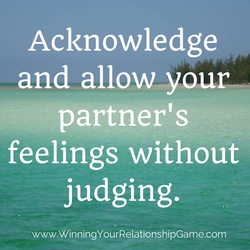|
#1 Do not discuss relationship issues with anyone of the opposite sex. This is history’s best and longest slippery slope. When we are vulnerable with another person it brings up a wellspring of emotions. Many, many affairs start with enjoying being heard by another person. It’s not safe, don’t do it. Family is ok if they meet these other criteria. #2 Do talk to someone who has what you want. The person who’s been divorced twice and is not in a relationship can tell you how to do that! She doesn’t know how to resolve relationship issues. Get advice from someone who’s worked through things themselves or talk to a professional that can give you an objective perspective. #3 Do talk to someone who wants to support your goals. Sometimes family and friends might not be fans of your partner for some reason. They’ll be happy to join the bitchin’ stew, which just increases your discontent. Is that what you want, more discontent? #4 Do talk to the person in the mirror. Remember you can only change you, so if you’re spending your time lamenting about things out of your control, look to your own boundaries. Are you thrashing about over things that you want your partner to change? Ask, but don’t demand or get into a power struggle over it unless it really is a non-negotiable. So before you start to engage with someone about your relationship issues, set yourself some rules and choose the right person for the job. Listening, Allison
Comments
 We don't usually have a problem taking care of our physical health or encouraging our partner to manage an illness. If our partner has diabetes, we believe they should eat right and take medications as directed by a doctor because that results in a measurable improvement most of the time. When the problem is a mental health issue however, we often don't give it the same consideration. Perhaps it's something to do with the disorders being "unseen". Maybe it's not understood and therefore scary. Maybe it's just plain old stigma, believing it's a weakness of character.
I must note that mental illness comes in many, many different forms. At this time, we have more than 200 different categorized forms of mental illness. They most common disorders that I've worked with are anxiety disorders and depressive disorders. Both can have a significant impact on functioning and when someone's functioning is impacted, their relationships will be too. Many times, one person in a relationship is a "fixer". When something is wrong, they feel the need to fix it. When a fixer's partner is anxious or depressed, the solution is rarely easily found. This can be very frustrating for a fixer. They may be feeling helpless and scared. And remember scared often looks like anger! The fixer may have no basis for understanding the problem or the solution. Both anxiety and depression affect how we think. when our thoughts become distorted they don't seem rational to other people. I don't know why my daughter is scared of spiders. Her anxiety takes over way out of proportion to the situation. People who are depressed won't do things that might help. But people with distorted thinking aren't logical! Trying to reason with them can be like arguing with a drunk person. It's futile. Many times, we want our partners to not be anxious or depressed because WE are uncomfortable. The best thing we can do is simply acknowledge our partners feelings and their right to their feelings. Sometimes when we don't feel validated in our feelings, we cling harder to them. So, if your partner has issues of anxiety or depression, you can help in the following ways: 1. Allow and acknowledge their feelings. Let them know their feelings are OK. We all want to feel accepted for who we are. 2. Encourage physical activity. Exercise has the ability to boost feel good hormones and discharge anxiety byproducts. if you participate with them, it improves connection! Just remember to gear the activity to your partner who is struggling. A nice, slow paced walk might be more doable than a jog. 3. Have a daily gratitude conversation. More and more research shows that gratitude is effective in counteracting depression. Help your partner verbalize things they're grateful for every day. Some days, I can only find gratitude for sunshine and cute flip flops! It still counts. 4. Help your partner balance their self care. All nature strives to find a balance. Some people need to incorporate focus on others. Most people I've worked with need to focus more care towards themselves. Both ends of this spectrum is unhealthy for most of us. Encourage more of what your partner needs. 5. Talk to your partner about getting help without judgement. If your partner can't move out of their situation, they may need to work with a counselor or consider medications. This is your partner's decision so be supportive! 6. Create a learning situation. Learning is a growth activity. It's hard to stay stuck when you're growing. Is there something your partner has always wanted to learn or been interested in? Might be ballroom dancing, might be a museum. Sign you both up for a class or plan an outing. Stand with them when their curiosity blooms. While I hope these suggestions are helpful, also keep the following in mind. Don't belittle your partner for feeling the way they feel. If they knew how to change it, they probably already would have. Know what your limitations are. If your partner is unsafe in any way, take them to an emergency medical setting right away and get help. Depression and anxiety are emotions that we all experience from time to time. Most of us bounce back from these emotions, but when they linger and mess with our functioning, we often need support to recover. Be part of that support system for your partner. As always, hope this helped! Email with your specific question and I'll try my best to get back to you personally. [email protected] Love and Be Lovely, Allison |
Helping You
|




 RSS Feed
RSS Feed

